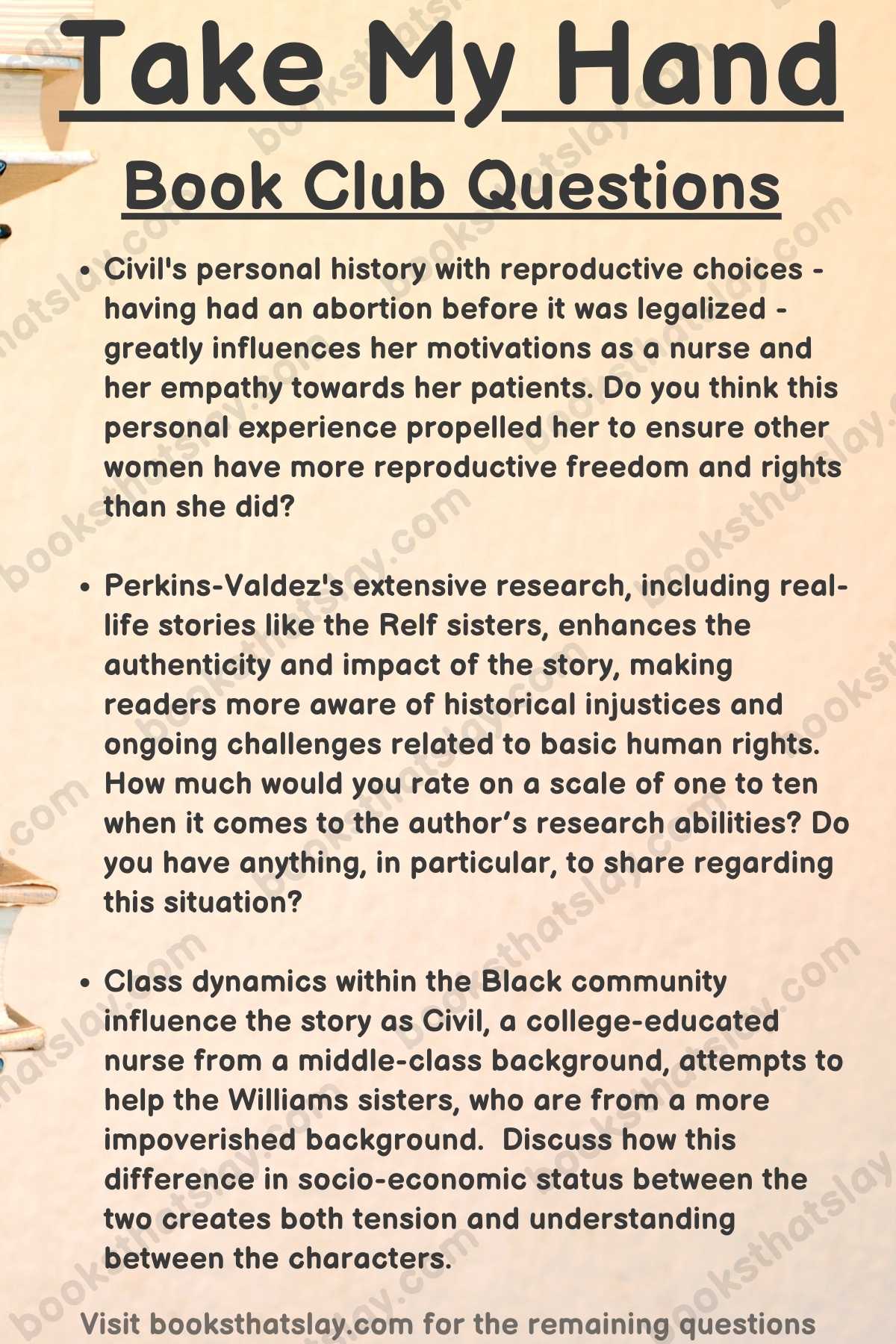10 Take My Hand Book Club Questions For Discussion
It’s 1973, Montgomery, Alabama.
Segregation’s shadow still hangs heavy, but change is brewing. A young Black nurse, Civil Townsend, joins the Montgomery Family Planning Clinic, eager to serve her community.
Unbeknownst to her, fate leads Civil beyond the clinic walls. Deep in the rural outskirts, two young girls, the Williams sisters, live in a ramshackle cabin. Their poverty and race make them targets for a controversial birth control program.
Civil connects with the girls, a bond that strengthens as tragedy strikes, leaving an indelible mark on all their lives.
Years later, Dr. Civil Townsend must confront the ghosts of the past. Forgotten stories resurface, demanding to be heard.
Welcome to your book club discussion guide for “Take My Hand” by Dolen Perkins-Valdez.
And now that you know how painful the novel is, let’s begin with the questions.

Take My Hand Book Club Questions and Discussion Guide
- “Take My Hand” is extremely relevant to today’s ongoing debates over reproductive rights and healthcare equity. The narrative contributes to our understanding of historical injustices related to reproductive health by shedding light on real-life incidents of forced sterilization and coercion, revealing the systemic issues that disproportionately affected poor, Black, and disabled women. What are your thoughts on this issue, particularly its impact on marginalized communities?
- Class dynamics within the Black community influence the story as Civil, a college-educated nurse from a middle-class background, attempts to help the Williams sisters, who are from a more impoverished background. How does the difference in socio-economic status between Civil and the Williams sisters create both tension and understanding between the characters?
- Perkins-Valdez’s extensive research, including real-life stories like the Relf sisters, enhances the authenticity and impact of the story, making readers more aware of historical injustices and ongoing challenges related to basic human rights. How would you rate the author’s research abilities on a scale of one to ten? Do you have any specific thoughts on the author’s approach to this situation?
- Civil’s personal history with reproductive choices, such as having had an abortion before it was legalized, greatly influences her motivations as a nurse and her empathy towards her patients. Do you think this personal experience propelled her to ensure other women have more reproductive freedom and rights than she did?
- The historical setting of “Take My Hand” reflects the socio-economic and racial challenges in post-segregation Alabama, where systemic racism, poverty, and inadequate healthcare and education disproportionately affected African American communities. In the story, this is especially highlighted in the sterilization of Erica and India, two young Black girls who were coerced into birth control due to their socioeconomic status. What factors should be considered when choosing a birth control method? Are there any safe non-hormonal alternatives to birth control pills that you have tried? Additionally, with abortion bans plaguing the country, could you shed some light on this matter?
- Civil expresses her surprise that Miss Pope, who worked at Tuskegee University, did not know about the surgical sterilizations of the Williams sisters. Miss Pope responds by expressing her own confusion and questioning how such atrocities could happen without her knowledge. Do you think this exchange revealed the pervasiveness of systemic injustices and the realization that even those in proximity to such events may remain unaware or uninformed, emphasizing the need for greater awareness and action?
- Civil Townsend, the protagonist of the novel, is a complex character whose personal history and chaotic life deeply influence her perspective and actions. Her own past experiences and struggles make her more empathetic towards the Williams family, whom she comes to love and feel responsible for. What is your take on this character representing the intersection of personal growth, historical context, and the responsibility to protect and advocate for others?
- Dolen Perkins-Valdez uses her writing style to create a vivid and authentic atmosphere of Montgomery in 1973. She includes specific details that evoke the time and place, such as the sounds of ice cream trucks in summer, the drawl of a Southern judge, and the music of Booker T. and the M.G.’s on the record player. How did these details immerse you in the setting of the 70s? Did you feel that you were experiencing the events and images of that particular time period firsthand?
- The phrase “Take My Hand” evokes a sense of connection, support, and guidance. In the context of the novel, it reflects the need for empathy and solidarity, particularly for Black girls and women who have historically been mistreated and lacked protection. Do you think the title is justified? If yes, discuss why. If no, suggest a better title.
- “Take My Hand” goes beyond entertainment by delving into the deeper purpose of extraordinary fiction, which involves illuminating important aspects of history and human experiences. The novel is crafted to reveal the underlying truths and complexities of its story. By exploring themes of right and wrong, attention and carelessness, racism and justice, the novel prompts us to reflect on broader social issues and engage with the moral implications of historical events. Discuss how the novel achieves this.
If you liked this set of questions here are a few other options you can consider.